COCAL X Conference in Mexico City
August 2012
The tenth conference of the Coalition of Contingent Academic Labor (COCAL) - a coalition of non-tenure track faculty from Canada, Quebec, the U.S., and Mexico - was historic for at least two reasons. Not only was it the largest since its inception in 1996, with 250 registered attendees, but also this was the first time the conference had been held in Mexico.
This well-organized three-day conference was held at the National Autonomous University of Mexico (UNAM) in Mexico City,
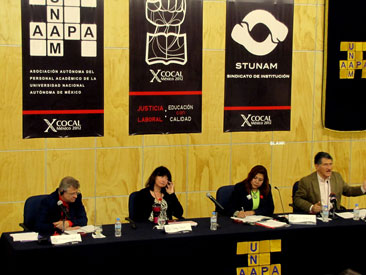
COCAL X Plenary
(Photo by David Milroy)
from August 9 through August 12, 2010, largely thanks to the efforts of two members of the local Mexican organizing committee, Maria Teresa Lechuga and Arturo Ramos, who orchestrated the invaluable support of the two largest unions at UNAM: AAPA-UNAM and STUNAM. Equally historic was that this was the first time these two unions worked together in over 30 years. The local organizing committee was assisted in planning by the COCAL International Advisory Committee, composed of contingent leaders from the US, Mexico, and Canada, including staff representatives from major unions.
A central point that emerged from the five plenaries and the nine breakout workshops was that despite the cultural differences between Quebec, English-speaking Canada, the U.S., and Mexico, the challenges faced by the increasing number of public and private college and university professors who lack structural job security - known in different institutions as adjuncts, lecturers, sessionals, irregular faculty, or - in Mexico - as precarious faculty - are essentially the same: substandard exploitative wages, lack of benefits, marginalization within their institutions, and a lack of dignity.
A recurring theme of the conference was that these ills can be attributed to a globalized neoliberal economy that has led to the corporatization of public higher education and the monetization or "tariffication" of education, which also explains the rising debt load of students - currently $1 trillion in the U.S. alone.
Instead of recognizing that state-supported higher education enhances the public good, transnationally we are witnessing the rise of a countervailing practice that situates students as private "consumers" and faculty as interchangeable "information providers," while the corporate intrusion into public universities leverages public investment into research for private gain.
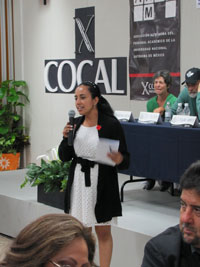
Maria Teresa Lechuga
(Photo by David Milroy)
Finally, there emerged a general consensus that to protect the historic role of public higher education and create more inclusive and equitable working conditions for those who comprise 70% of the faculty, there needs to be alliances between teachers, students, and the other elements of the labor movement. To paraphrase the late labor leader Joe Hill: "Don't complain; organize!"
The conference planners had anticipated this need for alliance and arranged for scholarships to bring graduate student activists from Quebec, Mexico, Puerto Rico, and the United States to open the conference; the young people reported on student protest movements from the Printemps Erable ("Maple Spring") movement, the Yo Soy 132 ("I am the 132nd") movement in Mexico, the Occupy Wall Street movement, and the student movement that has been fighting tuition increases in Puerto Rico, They were received to great acclaim since many of the COCAL organizers have long realized the need for the involvement of a new generation.
COCAL X also cut new ground by going beyond North America for the first time. A grant from the Berger-Marks Foundation enabled them to invite a plenary speaker from South Korea, Kyung-Ae Oh, who reported that difficult conditions for faculty in South Korea – job insecurity, harsh working conditions, very low pay, disrespect, and little hope – prevail. The Korean company, Samsung, has a plan for its English-language school, at Sungkyunkwan University, to eliminate tenured faculty altogether in its undergraduate program by 2020, a trend that is not unheard of in North America.
Soon after the conference, the participants received some sad news, the passing of Steve Street, a colleague who had taught writing and literature at numerous colleges since 1980, including the State University of New York at Buffalo, and who had been scheduled to attend COCAL X. He was a vital force in the contingent academic labor movement and an inspiration to many. He will be deeply missed.
Conference Program
Pre-conference presentation of the book “Magister Changarrization"
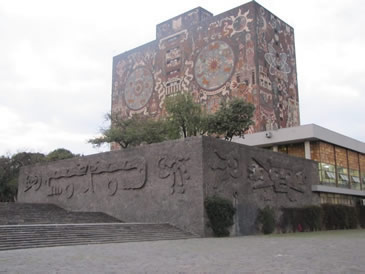
UNAM Library
(Photo by David Milroy)
Moderator: Pedro Hernandez (Sección 9, CNTE)
Carlos Sifuentes (STAUACH/Ciencias Sociales)
Edgar Belmont (Universidad Autonoma de Queretaro)
Juan Bravo (Presidente de COPACSOH, FES Acatlan, UNAM)
Authors: Arturo Ramos y María Teresa Lechuga
Friday, August 10th
Student conference “The movements of students in America (Chile, Québec, Occupy-USA, #Yo soy 132-México) "
Opening lunch speakers
Moderator: Elizabeth Perez (Teacher UNAM/Mexican Committee of COCAL)
Agustín Rodriguez (Secretary General-President of STUNAM)
Secretary General-President of SITUAM
Maria Auxilio Heredia (Secretary General-President of SUTUACM)
Angel Balderas (Secretary General-President of SUPAUAQ)
Raul Perez (Secretary General-President of SUTIEMS)
Bertha Guadalupe Rodriguez (Secretary General-President of AAPAUNAM)
Plenary 1 “Changes of academic labor in the context of the neoliberal globalization"
Arturo Ramos (Former Secretary General-Former President STAUACH/Mexican Committee of COCAL)
Michael Fabricant (AFT)
Axel Didriksson (UNAM Researcher )
Short film “Contingent Academic Labor in Higher Education in Mexico”
Plenary 1 Workshops
Teotihuacan Pyramids
(Photo by David Milroy)
1. Teaching, researching, and disseminating knowledge to the larger community, including academic management of e-learning
Michel Sarra-Bournet: Promesses et menaces de la formation à distance
Eileen Kennedy: Distance Learning: The Debate Continues at the City University of New York
José Luis Sandoval Dávila: Síndrome del ejercicio docente de los profesores de asignatura en la UNAM
Gerardo Reyes Hernández, Julieta María de Lourdes García Pérez y J. Alejandra Villagómez Ruiz: Funciones de los docentes de la universidad
Sergio Stanford Camargo, Deyanira Etain Varona Graniel, Jorge Padilla Ramírez y Marcela Patricia Ibarra González: La educación a distancia, una alternativa para mejorar la situación del docente de asignatura en la UNAM
Curtis Keyes Jr.: Union Protection, Union Vulnerability and the Adjunct Faculty
2. Gaining and maintaining health, unemployment, and retirement benefits
Jonathan Karpf: Gaining and Defending Unemployment Rights for Contingent Faculty
Simón Salamanca Rodríguez: Breve Estudio del Problema de la Seguridad Social en México y la participación del STUNAM
Susan DiRaimo: The Pension Program for Adjuncts at CUNY
Marcia Newfield: Preserving Health Insurance Benefits for Adjuncts at CUNY: Crisis and Opportunity.
María Eugenia Borrego: Mora Retiro justo del personal académico en la UNAM
Cristina Casas Flores: Definitividades y plazas de carrera para una jubilación digna. Un derecho inalcanzable para los profesores de asignatura
3. Supporting academic improvement, evaluation processes, and recognition
Sandra Baringer: Working through the Professional Associations: The MLA’s Professional Employment Practices Document as Advocacy Tool
Bladimir Juárez Durán: El rejuvenecimiento de la planta docente, una opción para la superación académica en la universidad. El caso de la licenciatura en Ciencias Políticas y Administración Pública de la FES Acatlán-UNAM
Natalie Sharpe and Dougal MacDonald: Deskilling of Academic Labour at Athabasca University, Canada
Juan Antonio Rosado Zacarías: La UNAM como reflejo de un sistema económico-social: la triste situación de los profesores de asignatura
Miguel Rafael Polanco Mireles: La evaluación del profesor de asignatura de la ENP de la UNAM
Zenia María Gutiérrez Tintor: Tabulador para promoción del personal académico de la UNAM
Saturday, August 11th
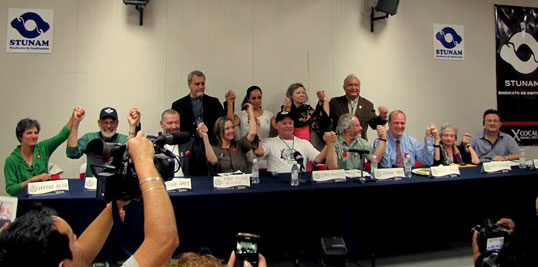
COCAL X Plenary
(Photo by David Milroy)
Plenary 2 “Organization and new forms of struggle by academic workers, challenges and strategies for 21st century,"
Moderator: Lilia Abarca (Seccion 10 CNTE)
Maria Maisto (President NFM)
Arturo Alcalde (Labor consultant of university unions)
Short film “University Union Movement in Mexico”
Plenary 2 Workshops
4. Forming and building unions, associations, federations, networks and coalitions
Joe Berry: The Elephant in our Living Room: Organizing Faculty in For-Profit Higher Education
David Hatchett and Diane Menna: Organizing Adjunts at the City University of New York
Judy Olson: Organizing Contingent Faculty in the National Education Association: Challenges and Possibilities
Ernesto Ortiz Cruz: Reto de los sindicatos ante la política neoliberal y la globalización en el mundo
CNTE: La coordinadora Nacional de Trabajadores de la Educación
Cesar Alejandro López Mendoza: Un testimonio en torno a la flexibilización laboral y el trabajo precario del joven docente
5. Expanding employment rights: hiring, retention, tenure, wages, health benefits, and safety
Caralee Angell, Heather Dittmore, and Minoo Marashi: Workload for PT Faculty and the recent contract language for PT Faculty Overload
Michael Batson: Organizing the Alienated: Contingent Faculty and Employment Rights
Beatriz Diana Zalce de Guerriff y Juan Amael Vizzuett Olvera: Un caso concreto de violación impune al Estatuto del Personal Académico en la UNAM
Juan Sánchez Vázquez: Las Relaciones Académico Laborales en la Educación Media Superior y Superior UNAM
Rafael Palacios Abreu: Los contratos mixtos: expresión de inestabilidad laboral en la UNAM
María Olivia Noguez Córdova y Consuelo Molina Arciniega: Estabilidad laboral: la realidad del profesor de asignatura
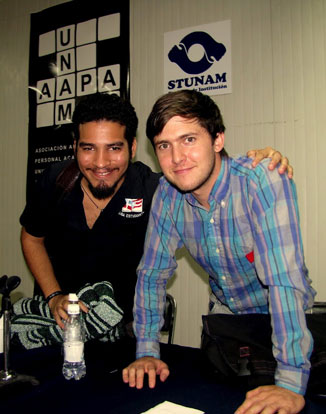
Student Conference
(Photo by David Milroy)
6. Strengthening union rights: institutional recognition, alliances and federations, collective bargaining rights, and labor laws and regulations/Supporting political rights, cultural rights, and academic freedom
Jack Longmate: Taxonomy of Attitudes about Equity and the Contingent Faculty Movement
María de Jesús Ramos Casiano y Hortensia Escobar Hernández: La precariedad de la vida académica: la realidad de los profesores adjuntos y la falta de acción sindical en su defensa
Carol Gray: The Struggle for Academic Freedom in Egypt
Chriss Agee: Case Studies On Contingent Academic Labor Struggles-As Seen Through Academic Social Movement Literature
Carlos Ortiz Mondragón: El neoliberalismo y la globalización. Efectos y consecuencias en la universidad pública.
Ángel Oliva Mejía: La figura contractual del técnico académico y su representación en los cuerpos colegiados de la UNAM
7. Exploring forms of struggle and achievements: campaigns, negotiations, demonstrations, work stoppages, strikes, and use of new technologies and social media
Margaret Hanzimanolis: Data Streams in a Data Desert
Hugo Cruz: Educación y trabajo. La izquierda de la ciudad de México dentro del escenario de la globalización neoliberal
Leticia Elizabeth Montaño Archundia: La lucha del SUTIEMS también es por la defensa de la educación pública
Bryan Kennedy: Lessons from Wisconsin: How Unions Are Rethinking their Strategies in the Age of Austerity
Isabel Mendoza García: Tácticas de lucha implementadas por el sindicato (AAPAUNAM) para lograr la estabilidad del profesor de asignatura “A” interino
Alfredo Álvarez Padilla y Claudia Ayluardo Archundia: El desafío laboral del trabajo técnico académico en el contexto de los servicios educativos y profesionales de la UNAM
Plenary 3 “Culture and identity of the new academic citizens in North America and the world"
Moderator: Bruno Luna (Secretary de Organización Academica STUNAM)
Mexico: Hugo Aboites (Former Secretario General-Former President SITUAM)
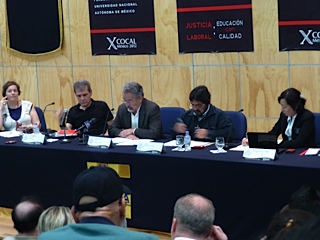
COCAL X Plenary
(Photo by Vinny Tirelli)
Plenary 3 Workshops
8. Creating a sense of academic culture and university identity: freeway flyers and working with multiple assignments and institutions/New forms of academic citizenship, new work and the changing university community: finding spaces of resistance to the corporate model of higher education
Richard Aberle: Class Dismissed: New Pedagogies of the Oppressed and the Restructuring of Social Class in American Higher Education
Francis Lagacé: Le Conseil central du Montréal métropolitain-CSN contre le modèle néolibéral en education
José Antonio Mendoza Aguirre: Académicos de asignatura
Esteban Piña Pére: El tiempo en la docencia
Edgar Israel Belmont Corté: El trabajo académico bajo tensión
Luis Enrique Tejero Carrer: El espíritu universitario de los técnicos académicos
9. Fighting discrimination and inequality: multicultural identity, race, ethnicity, gender, sexuality, and different capabilities
Loretta A. Ragsdell: Fostering a Radically Inclusive Environment in a Multicultural Classroom
Katie Walkiewicz: Building Alliances between Graduate Employee Unions and the Broader Labor Community: A Case Study of the Graduate Employees’ Organization at the University of Illinois at Urbana-Champaign
Delia Selene de Dios Vallejo: Trabajo de mujeres académicas universitarias en situación precaria
Jack Longmate: The Program for Change After Two Years
Dirigente del nuevo sindicato de Kaplan en New York
Raquel Guillén: Problematica del profesor de asignatura
10. Building connections between the contingent academic worker and the university community: tenure-track faculty, research faculty, students, staff, and administrators
Steven Weisblatt: A Semester in the Chair, a Semester of Work and Opportunities
Leilani Grajeda-Highley: Today’s Students-Tomorrow’s Coalition Builders: Making the union movement meaningful for students
Gresilda A. Tilley-Lubbs: Cutting Across Disciplines to Work Collaboratively to Provide Equity and Access to Education for All Students
Erik Caballeros Medina: Seudo empresarios precarios. Los contratos de honorarios en la UNAM
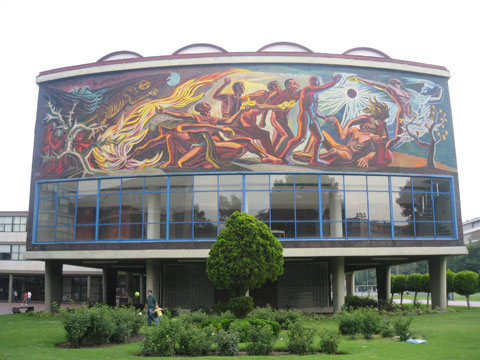
UNAM
(Photo by Naomi Ibuki)
Claudio Albertani: La lucha por la UACM
Sunday, August 12
Plenary 4 “Future and perspectives of organization and struggle of COCAL”
Moderator: Maria Teresa Lechuga (STUNAM/Mexican Committe of COCAL)
Members of International Advisory Committee of COCAL
Short film “COCAL X in Mexico”
Closing ceremony
Moderator: Maria Teresa Lechuga (STUNAM/Mexican Committee of COCAL)
Bertha Guadalupe Rodriguez (Secretary General-President AAPAUNAM)
Agustín Rodríguez (Secretary General-President STUNAM)
Guest of honor: José Narro (Rector of UNAM)
Meeting of COCAL International Advisory Committee and Mexican Committee
